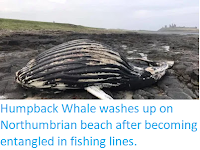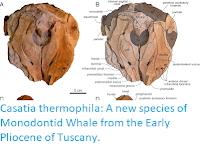A Whale, believed to be an immature Fin Whale, Balaenoptera physalus, has been found in the Thames Estuary, England. The animal was found at Denton, near Gravesend on the morning of Friday 18 October 2019, according to the Port of London Authority, and has been removed so that a necropsy (animal autopsy) can be carried out by the Zoological Society of London. The body of the Whale was discovered only ten days after the body of anouther Whale, an immature Humpback, Megaptera novaeangliae, that had been in the river for several days, was found dead near Greenhithe in Kent. A necropsy on that animal showed that it was severly undernourished at the time of death, and was suffering from a heavy parasite load, though the cause of death appeared to be a fractured jaw and associated large wound which appears to have bled heavily, and is thought to have been caused by a ship strike.
A dead Whale found in the Thames Estuary near Denton in Kent being winched out of the water to undergo a necropsy investigation. Triangle News.
This is the third Whale to have been found dead in the Thames Estuary this year, another Humpback having been found near Dartford in Kent on 12 September, and the fifth in the UK, with two strandings having been recorded in Northumbria. The previous most recent recorded Whale death in the UK was in 2009 when a juvenile male Humpback was found near Dartford. A Beluga Whale, Delphinapterus leucas, spent several months in the Thames Estuary in 2018, but eventually left of its own accord.
Many species of Whales were hunted almost to extinction in the nineteenth and twentieth centuries, prior to a moratorium on almost all Whale hunting that was introduced in the 1970s. The reporting of greater numbers of dead Whales on our shores is often distressing, and can appear to be sign of more Whales dying in inshore waters, but in fact this greater number of dead Whales reflects a larger population of Whales being present offshore, and is a symptom of recovering populations.
See also...
Follow Sciency Thoughts on
Facebook.







